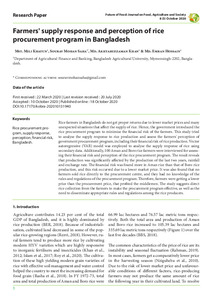Datum
2020-10-18Schlagwort
630 Landwirtschaft, Veterinärmedizin BangladeschReisproduktionSubventionLebensmittelangebotLebensmittelnachfragePreisrisikoMetadata
Zur Langanzeige
Aufsatz

Farmers’ Supply Response and Perception of Rice Procurement Program in Bangladesh
Zusammenfassung
Rice farmers in Bangladesh do not get proper returns due to lower market prices and many unexpected situations that may affect the supply of rice production. To protect the farmers, the government introduced the rice procurement program. This study tried to analyse the supply response to rice production and assess the farmers’ perception of government procurement program including their financial risk of rice production. Vector autoregressive (VAR) model was employed to analyse the supply response of rice using secondary data. In addition, 100 Aman and Boro rice farmers were interviewed for assessing their financial risk and perception of the rice procurement program. The result reveals that present production was significantly affected by the production of last two years, rainfall and exchange rate. The financial risk was more in Aman rice compared to Boro rice production. This risk was occurred due to a lower market price. It was found that no farmers sold rice directly to the procurement centre and they had no knowledge of the rules and regulations of the procurement program. Therefore, they were getting a lower price than the procurement price where middlemen were getting the benefit. The study suggests direct rice collection from the farmers to make the procurement program effective, as well as rules and regulations need to be disseminated properly among the rice producers.
Zitierform
In: Future of Food: Journal on Food, Agriculture & Society Vol. 8 / No. 3 (2020-10-18) EISSN 2197-411XSammlung(en)
Vol 08, No 3 (2020) (Future of Food: Journal on Food, Agriculture & Society // The Future of Food Journal: Journal on Food, Agriculture & Society)Zitieren
@article{doi:10.17170/kobra-202010131940,
author={Khatun, Mili and Mohan Saha, Sourav and Khan, Akhtaruzzaman and Hossain, Emran},
title={Farmers’ Supply Response and Perception of Rice Procurement Program in Bangladesh},
journal={Future of Food: Journal on Food, Agriculture & Society},
year={2020}
}
0500 Oax
0501 Text $btxt$2rdacontent
0502 Computermedien $bc$2rdacarrier
1100 2020$n2020
1500 1/eng
2050 ##0##http://hdl.handle.net/123456789/11966
3000 Khatun, Mili
3010 Mohan Saha, Sourav
3010 Khan, Akhtaruzzaman
3010 Hossain, Emran
4000 Farmers’ Supply Response and Perception of Rice Procurement Program in Bangladesh / Khatun, Mili
4030
4060 Online-Ressource
4085 ##0##=u http://nbn-resolving.de/http://hdl.handle.net/123456789/11966=x R
4204 \$dAufsatz
4170
5550 {{Bangladesch}}
5550 {{Reisproduktion}}
5550 {{Subvention}}
5550 {{Lebensmittelangebot}}
5550 {{Lebensmittelnachfrage}}
5550 {{Preisrisiko}}
7136 ##0##http://hdl.handle.net/123456789/11966
<resource xsi:schemaLocation="http://datacite.org/schema/kernel-2.2 http://schema.datacite.org/meta/kernel-2.2/metadata.xsd"> 2020-11-13T11:49:46Z 2020-11-13T11:49:46Z 2020-10-18 doi:10.17170/kobra-202010131940 http://hdl.handle.net/123456789/11966 eng Urheberrechtlich geschützt https://rightsstatements.org/page/InC/1.0/ rice procurement program supply response perception financial risk Bangladesh 630 Farmers’ Supply Response and Perception of Rice Procurement Program in Bangladesh Aufsatz Rice farmers in Bangladesh do not get proper returns due to lower market prices and many unexpected situations that may affect the supply of rice production. To protect the farmers, the government introduced the rice procurement program. This study tried to analyse the supply response to rice production and assess the farmers’ perception of government procurement program including their financial risk of rice production. Vector autoregressive (VAR) model was employed to analyse the supply response of rice using secondary data. In addition, 100 Aman and Boro rice farmers were interviewed for assessing their financial risk and perception of the rice procurement program. The result reveals that present production was significantly affected by the production of last two years, rainfall and exchange rate. The financial risk was more in Aman rice compared to Boro rice production. This risk was occurred due to a lower market price. It was found that no farmers sold rice directly to the procurement centre and they had no knowledge of the rules and regulations of the procurement program. Therefore, they were getting a lower price than the procurement price where middlemen were getting the benefit. The study suggests direct rice collection from the farmers to make the procurement program effective, as well as rules and regulations need to be disseminated properly among the rice producers. open access Khatun, Mili Mohan Saha, Sourav Khan, Akhtaruzzaman Hossain, Emran Bangladesch Reisproduktion Subvention Lebensmittelangebot Lebensmittelnachfrage Preisrisiko publishedVersion EISSN 2197-411X No. 3 Future of Food: Journal on Food, Agriculture & Society Vol. 8 false </resource>
Die folgenden Lizenzbestimmungen sind mit dieser Ressource verbunden:
Urheberrechtlich geschützt

